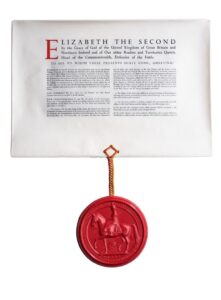If data is the stuff that keeps the University in motion, information is what drives it forward and records supply proof of the direction of travel, then archives allow us to see the roads we’ve taken and how far we’ve come. They bind us to our shared past, building collective memory and shaping identity. Archives also help to steer us into the future. But you can’t have good archives if you don’t look after your data and information. Please read on to find out about how treating data and information right plays a part in safeguarding the University’s history.
Where it all begins
Let’s look at an obvious example. The University of Bath officially came into being on 25th October 1966 when it was granted a royal charter of foundation. The charter is a (very formal) record of the Queen’s decision to permit the University’s existence and is therefore of vital importance. It sets out the objectives, powers, officers and statutory bodies of the University and defines it as a teaching, research and degree awarding body.
It even looks the part - everyone knows that top-end archives involve curly writing, parchment and an enormous wax seal:

The charter is fundamentally historic but, at the same time, it’s inextricably linked to the University’s present and future: your classic archival material.
We take extra special care of the charter for obvious reasons. You can read about how it got a new, made-to-measure home in our Cabinet of Curiosities.
Archives, what are they good for?
The University Archives contain records of all shapes and sizes selected for permanent preservation because of their lasting value to the University, to researchers and to the general public. Not all archives are as grand or fancy as the charter, but they all have a story to tell. The University Archives tell the story of the University, its business and structures, its failures and triumphs, its purpose, processes, places and people.
Committee minutes tell us about evolving institutional values, strategy, priorities and decision-making. Prospectuses tell us about the changing shape, content and delivery of academic programmes. Assessment and research records tell us about learning, teaching, innovation, impact and lots of hard work. Student newspapers tell us about student life while degree ceremony brochures tell us about individual and organisational achievement and celebration. The University Photographic Collection tells us what it all looked like. And on and on; you get the idea.
Where the University of Bath came from is part of what the University of Bath is and will become. Please don’t underestimate the archives! To tell the story we need the right kind of archives which means we need to manage data, information and records carefully.
If you’d like to learn more about the University Archives or arrange a visit to see some, please get in touch with the University Archivist and Records Manager.
Let the archives be with you
When the data and information you look after reaches the end of its usefulness - when it’s stopped being something you refer to on a frequent or regular basis - start thinking about its final disposal. Some will need to be securely deleted/destroyed as per the Records Retention Schedule, and some should be transferred to the University Archives.
If information is power - and it definitely is - the archives are where that power is located in the long-term. (Why else do you think bad people are in such a hurry to alter, suppress and destroy them?) Some of the data and information you create and use today are the archives of tomorrow. Bear this in mind when your data and information has served its purpose; it may have more to offer.
Remember…
- Treat your data and information with the respect they deserve - see our Data and Information Management Guide
- Use the Records Retention Schedule to find out what to delete/destroy when, and what to keep, where
- Contact the University Archivist if you think your data and information may have historical value
- For research data, check whether your funder or Bath’s Research Data Policy requires preservation of your data
Respond
